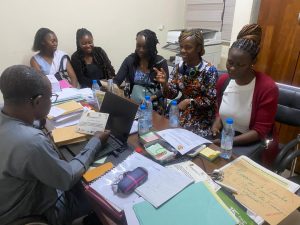
News Upfront: Thank you for taking the time to speak with me today. Can you please introduce yourselves and share your roles in organizing the mental health rights congress?
Franca Ma-ih Sulem Yong: It’s my pleasure. Thanks for all you do to share accurate information. My name is Franca Ma-ih Sulem Yong. I am the founder and President of Afrogiveness (Africa+Forgiveness), a movement I founded in 2018 to enable survivors of conflict and intolerance to heal through forgiveness and release through arts. I am also the Initiator of the Mental Health Rights Congress, which I am organizing along with our partner, the African Initiative for Health and Research Promotion(AIHP) with the Institutional Support of Cameroon’s National Assembly and Cameroon’s Ministry of Public Health.
Background and Context
News Upfront: Can you describe for us the current mental health situation in Cameroon?
Franca Ma-ih Sulem Yong: Cameroon currently faces a global human rights emergency in mental health. Underpinned by poor societal attitudes towards mental illness and inadequate resources, facilities and mental health staff, the mental health system is in shambles. Cameroon has no ample mental health legislation. It has become increasingly urgent to regulate Cameroon’s mental health system, particularly in the face of three concurrent humanitarian crises: the Boko Haram insurgency, the Anglophone conflict, and the refugee crisis, which have disrupted the lives of over 4.3 million people. These crises have caused widespread emotional distress and psychological challenges, further compounded by the pervasive effects of poverty. With the neglect and stigmatization of mental health during conflicts, individuals affected by these conflicts are succumbing to feelings of resentment and despair, fueling cycles of violence and paving the way for the proliferation of violent extremism.
News Upfront: Tell us about the inspiration to organize a mental health rights congress in Cameroon, and how does the congress aim to address the mental health needs of these victims?
Franca Ma-ih Sulem Yong: This Mental Health Rights Congress (MERIC), which is the first of its kind in Cameroon, was inspired by our realization that mental health and personal healing are necessary for peace, human rights and sustainable development. It goes without saying that people can only be at peace with others if they are at peace with themselves and they can only be productive and at peace with themselves if their minds are healthy.
The Mental Health Rights Congress is therefore a golden opportunity for traumatized victims of conflict, mental health survivors, mental health practitioners and all stakeholders to unite our efforts to raise the agenda of mental health. It is an opportunity for traumatized victims of conflict and mental patients to advocate for their mental health rights before parliament and an opportunity to advocate for a Mental Health Law that would regulate the mental health system in Cameroon.
Objectives and Goals
News Upfront: What are the primary objectives of the mental health rights congress?
Franca Ma-ih Sulem Yong: The objectives of the Mental Health Rights Congress are to advance mental health and personal healing as an essential component of peace, human rights and sustainable development; to offer traumatized survivors of conflict and mental illness an opportunity to advocate for their mental health rights before parliament and to advocate for mental health legislation
News Upfront: What specific goals do you hope to achieve through this event?
Franca Ma-ih Sulem Yong: The specific goal of this event is to engage parliament (the legislative arm) as well as government (executive arm) and the judiciary arm of Cameroon to consider enacting a law which will define mental health conditions, protect the rights of the patients, the practitioners and the community, regulate the administration, treatment and funding of mental health and make mental health an essential component of all humanitarian aid, relief, and emergency response efforts during conflict in Cameroon.
News Upfront: How will the congress promote mental health rights in Cameroon?
Franca Ma-ih Sulem Yong: This congress would promote mental health rights by ensuring that the need for mental health legislation is discussed, for the first time, before parliament.
Organization and Partnerships
News Upfront: Can you describe the planning process for the congress, as in which organizations or stakeholders are involved in the congress, and what roles are they playing, plus how you have collaborated with local communities, government agencies, or international organizations to ensure the congress’s success?
Franca Ma-ih Sulem Yong: The organization process is daunting but we are grateful for all our partners. For the past four years, we have been collaborating with an array of partners to get here: Executive, Legislative, Judiciary, Civil Society, Media, among others. In 2021, having noticed how our efforts to heal survivors of conflict/intolerance, remain futile in the absence of a mental health law, we convened the first Mental Health and Psychosocial Disability Policy Forum (MEHPOF) during which we engaged survivors of conflict-related trauma, persons living with mental health conditions and policy stakeholders to advocate for a stand-alone mental health law in Cameroon. The MEHPOF which we co-organized with the African Initiative for Health and Research Promotion (AIHRP) equally engaged partners like OHCHR’s United Nations Centre for Human Rights and Democracy(UNCHRD) in Cameroon, the United Nations Information Centre(UNIC), World Health Organization(WHO), Cameroon’s executive, legislative and judiciary arms and key civil society organizations in the field.
In 2022, we further initiated the Mental Health Legislators Project (MEHLEP) through which we led delegations of legislators to a “village of mental patients,” inspiring them to donate food, clothing and medicine. The MEHLEP also encouraged legislators to take the initiative of enacting Cameroon’s first Mental Health Law more seriously. This project did not only effectively engage the National Assembly and key government ministries like Cameroon’s ministry of health (MINSANTE) and Cameroon’s Ministry of Justice(MINJUSTICE) but also organizations like the United Nations Population Fund(UNFPA) and the Committee of Refugees in the Communes of Cameroon(CRCC).
In 2023, we initiated the Mental Health Rights Training (MEHRIT) done online to train survivors of mental illness and conflict-related trauma on mental health rights and advocacy strategies so we can co-create solutions for a better mental health landscape in Cameroon.
Now in 2024, our advocacy efforts have finally led to the Mental Health Rights Congress (MEHRIC) during which survivors of conflict-related trauma and mental illness as well as our array of actors across all sectors shall come to advocate for mental health legislation before the National Assembly in Cameroon.
Expected Outcomes and Impact
News Upfront: What do you hope participants will take away from the congress?
Franca Ma-ih Sulem Yong: We want all participants to understand that mental health rights are human rights. We want decision makers to understand how mental health affects peace, human rights and sustainable development and we hope parliament would understand the importance of enacting a mental health law which protects the rights of mental health patients and practitioners and regulates the mental health space in Cameroon.
News Upfront: How do you envisage the congress contributing to improved mental health outcomes for victims of crisis and conflicts in Cameroon, and what long-term impact do you anticipate the congress will have on mental health policy and practice in Cameroon?
Franca Ma-ih Sulem Yong: The congress would improve mental health outcomes for victims of crisis and conflicts by giving them a say before parliament, thus ensuring that they are stakeholders in the mental health law which shall be enacted on their behalf. By bringing mental health to the forefront of legislative discussions, the congress aims to foster greater awareness, reduce stigma, and prioritize the development of a comprehensive mental health framework. It provides a platform for those most affected by crises to share their experiences and insights, ensuring that the proposed legislation is both inclusive and effective. For the first time in history, refugees and traumatized victims of conflict shall speak about their mental health rights before parliament. Mental health has been suspected, neglected and stigmatized for way too long; the “invisible wounds” of conflict have been suppressed for too long-and this Mental Health Rights Congress shall open these wounds so we can see them and eventually heal them. This participatory approach not only empowers victims but also underscores the importance of mental health as a cornerstone for peace and sustainable development in Cameroon.
Challenges and Opportunities

News Upfront: What challenges have you faced while organizing the congress, and how have you addressed them?
Franca Ma-ih Sulem Yong: The greatest challenge we have faced is securing funding. Unfortunately, many funders remain hesitant to support mental health initiatives, often perceiving mental health as a luxury rather than a necessity, even for refugees and survivors of conflict. This misconception undermines the urgency of addressing the psychological scars caused by war and displacement. To overcome this challenge, we have relied on the dedication of our team and partners, alongside a commitment to raising awareness about the critical importance of mental health. Since 2018, Afrogiveness has consistently worked to highlight the psychological impacts of war, striving to shift the narrative and encourage both national and international stakeholders to prioritize the treatment of these “invisible wounds.”
News Upfront: Are there any opportunities that have arisen during the planning process that you’d like to highlight?
Franca Ma-ih Sulem Yong: One notable opportunity has been the chance to bring together a diverse range of stakeholders, including policymakers, mental health professionals, and survivors of conflict. This has created a unique platform for dialogue, where those directly affected by crises can share their experiences and influence the development of mental health legislation. Additionally, organizing the congress has strengthened partnerships with local and international organizations, amplifying our message and paving the way for collaborative action on mental health.
News Upfront: How do you see the congress evolving in the future to address emerging mental health needs in Cameroon?
Franca Ma-ih Sulem Yong: Looking ahead, we envision the congress becoming an annual event that adapts to the evolving mental health landscape in Cameroon. Future editions will expand to include more voices from grassroots communities, especially those in conflict-affected areas, to ensure their needs remain central to our advocacy. We also plan to integrate technological solutions, such as tele-health platforms, to bridge the gap in access to mental health care for remote and underserved regions. Over time, we aim to establish the congress as a key driver of policy reform, capacity-building, and public education on mental health, ensuring that it remains a catalyst for sustainable change.
News Upfront: Thank you for sharing your insights and perspectives on the mental health rights congress. Is there anything else you’d like to add or emphasize about this important initiative?
Franca Ma-ih Sulem Yong: In conclusion, I urge both national and international stakeholders to prioritize mental health as a critical component of peace-building and development. The world cannot achieve lasting peace, progress, or justice without addressing the invisible wounds that fuel and perpetuate conflict. As UNESCO’s timeless principle reminds us: “Since wars begin in the minds of men, it is in the minds of men that the defenses of peace must be constructed.”








